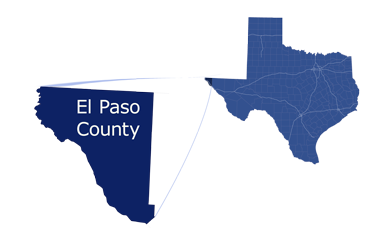Stationary Source Rules for the El Paso Area
Rules for stationary sources in the El Paso area that are part of the State Implementation Plan strategy to meet the National Ambient Air Quality Standards. The El Paso area includes El Paso County.

Controlling Ozone Pollution
Rules reduce ozone by limiting emissions of nitrogen oxides (NOx) and volatile organic compounds (VOCs) from the following stationary sources.
Controlling NOx Emissions
Rules limit NOx emissions from the following sources:
- Nitric Acid Manufacturing (rules apply statewide)
- Water Heaters, Small Boilers, and Process Heaters (rules apply statewide)
Controlling VOC Emissions
Rules limit VOC emissions from the following sources:
- Automotive Windshield Washer Fluid (rules apply statewide)
- Cutback Asphalt
- Degassing Storage Tanks, Transport Vessels, and Marine Vessels (rules are a contingency measure)
- Degreasing Processes
- Flexographic and Rotogravure Printing
- Fugitive Emissions
- Industrial Wastewater
- Loading and Unloading Operations
- Municipal Solid Waste Landfills
- Offset Lithographic Printing
- Petroleum Dry Cleaning Systems (rules are a contingency measure)
- Pharmaceutical Manufacturing
- Process Unit Turnaround and Vacuum-Producing Systems in Petroleum Refineries
- Storage Tanks
- Surface Coating Processes
- Transport Vessels
- Vent Gas (rules are a contingency measure for bakeries)
- Water Separation
Controlling Particulate Matter Pollution
Statewide rules limit particulate matter emissions and opacity from affected stationary sources. Fugitive dust control rules also apply in the El Paso area.
Controlling Sulfur Dioxide Pollution
Statewide rules limit sulfur dioxide emissions and ground-level concentrations from affected stationary sources.
State Implementation Plan
Information on the SIP to improve air quality in the El Paso area
Contact Information
- Contact the Stationary Source Programs Team for additional information about stationary source rules.
- Sign up to receive e-mail updates on SIP-related information, including information on stationary source rules. Select SIP Hot Topics under the Air Quality heading.
